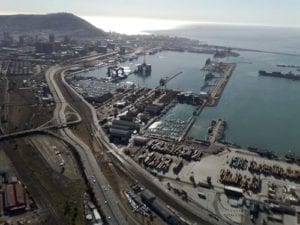Freight Forwarders plays an essential role in international trade through its involvement in the management of transportation, customs clearing, documentation, third-party payments and other elements of international supply chains. Simon Foulds speaks to Mike Walwyn, vice-chairman of the South African Association of Freight Forwarders (SAAF), about the freight forwarder’s role in ports.
Freight Forwarders is described as the architect of transport. Globalisation and the need to reduce cost over the entire supply chain have refocused the freight forwarder in ways that are innovative and functional. More involvement Walwyn, who is also the chairman of the Cape Town Port Liaison Forum and serves as Cape Town’s representative on the National Ports Consultative Committee, says: “The freight forwarding industry is moving away from the traditional narrow role that the industry perceives about it. We are no longer simply export forwarding, import clearing or customs broking agents, we are also logistics service providers and supply chain managers. Because the dynamics of the industry has changed, Freight Forwarders is getting more involved in its clients’ business operations so as to provide a service that involves the whole supply chain sector.” Clients “Because the Freight Forwarder’s first duty is to its clients, its business mandate is ensuring it expedites delivery at the lowest cost. One key aspect in this equation is having knowledge of how ports operate. Interestingly a forwarder’s own charges usually constitute the smallest proportion of the overall costs, yet the forwarder’s responsibility is often the greatest.” Walwyn says that a key aspect for everyone involved along the whole supply chain is that if freight forwarders can expedite port procedures, cost reductions and savings in time further along the route can be achieved. “Forwarders have realised that what is good for their clients is ultimately good for their own business. Hence the consequent involvement on a broader front because Forwarders realise it is more than just charging agency fees and simply getting reimbursed for services.” According to Walwyn, the freight forwarders’ industry is also pushing for more involvement in other key industry sectors, including Customs and other key government departments relevant to export and import industry, such as the Department of Transport and Perishable Products Export Control Board.“Within the port infrastructure, forwarders are also striving to be more actively involved and to have an input in the National Port Authority’s tariff process as well as with the relevant port consultative committees, harbour carriers associations, the Shipper’s Council and so forth. This is critical for our sector because all key players need to have a positive input into the industry as a whole for a more efficient logistical supply chain and so we can streamline operations and ensure costs do not escalate unnecessarily, making it too expensive for the economy to grow positively.”
Solutions “Because of the perceived lack of coordination between departments involved in port activities, it is important that we use the National Ports Consultative Committee membership as a forum to get discussions and resolutions started. What is also critical is that the National Ports Consultative Committee plays a key role in advising the Minister of Transport on port issues. “Other important aspects affecting the freight forwarding industry are the importance of transhipment and its impact on ports. There is a need for Transnet to review its strategy. Another important aspect is the current freight rates along with the impact of port operations.” He believes that there needs to be more interface between road and rail. “We know rail has been dysfunctional for years and we are looking forward to Transnet’s investment and upgrades to bring it up to a level which will match port productivity. “Then regarding the identification and elimination of bottlenecks at harbours it is crucial that authorities get the involvement of the harbour carriers to come up with solutions. After all it is the harbour carrier members that are responsible for ensuring the goods being brought in on the ships are dispatched and on the road to the right places on time.” The future Walwyn says that the Freight Forwarding industry will continue engaging with port authorities and the relevant government authorities to ensure the necessary structures are in place so that it can best serve its clients and so that South Africa is able to do business internationally. “The Freight Forwarding industry will continue playing a positive role at our ports and, in so doing, will ensure the economy continues to grow.”






